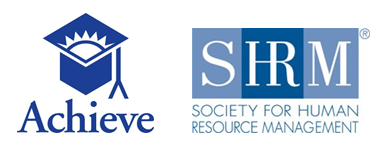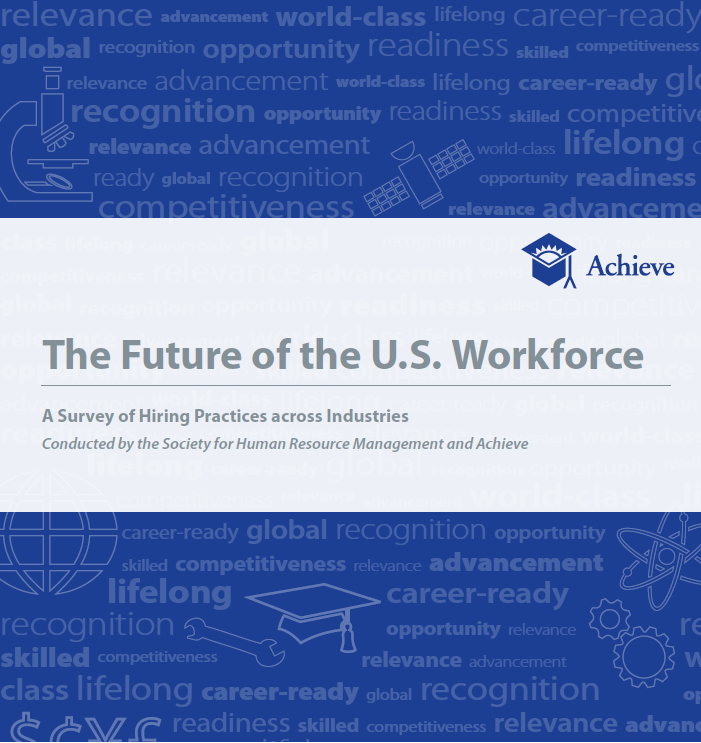All students should graduate from high school ready for college, careers, and citizenship.

SHRM-Achieve Joint Survey: Higher Education Levels Will Be Required For Most of Tomorrow's Jobs
Alexandria, Va. – October 3, 2012 – A new joint survey from the Society for Human Resource Management (SHRM) and Achieve shows that technical and educational requirements are rising across job categories.
"Today's tough job market means that many individuals are currently in jobs for which they have educational qualifications beyond those required for the position,” said Jennifer Schramm, GPHR, manager of workplace trends and forecasting at the Society for Human Resource Management (SHRM). "But this may not be the case down the line - education requirements are climbing for jobs across the board."
The responses of 4,695 HR professionals across nine industries and shows that:
- Compared with 10 years ago, today there are more jobs with specific technical requirements (said 51 percent); more STEM-related jobs (said 26 percent); increased employee diversity (said 45 percent); and simply a higher education level required for most jobs (said 46 percent);
- Looking ahead three to five years, HR professionals expect even jobs with specific technical requirements(said 60 percent); STEM-related jobs(said 31 percent); increased employee diversity (said 50 percent); and simply a higher education level required for most jobs(said 49 percent); and
- There are also fewer entry-level jobs today compared to 10 years ago (said 31 percent) and fewer expected in the next three to five years (said 30 percent, also).
The survey was released today during SHRM’s annual strategy conference being held in Palm Springs, California and attended by more than 500 HR executives.
"This survey reinforces the importance of having strong K-12 and postsecondary education systems that provide all students with the knowledge and skills they need to access, and succeed in the careers of their choice," said Sandy Boyd, Senior Vice President, Strategic Initiatives, Achieve. "It's clear that the world has changed and employers are demanding more education and skills from employees than ever before. All students deserve a meaningful and rigorous academic experience that will prepare them for college, careers and life."
HR professionals responding to the survey say education and training can correct the job skills mismatch. Training includes post-secondary certificate programs, highly job-specific training, and employer-sponsored professional development. Education includes training as well as bachelor's degrees, associate’s degrees, and advanced degrees.
What it means for workers and employers across the country is that, for example:
- Future administrative and secretarial positions will require more education such as an associate's degree (said 21 percent of HR professionals) or a post-secondary certificate (said 11 percent);
- For salaried, individual contributors and professionals, future positions will require a bachelor's degree (said 71 percent of HR professionals) or an associate’s degree (said 12 percent);
- Skilled laborers such as technicians, mechanics, and foremen will need a specific post-secondary certificate or specific credentials for future jobs (said 31 percent of HR professionals); and
- While the majority of workers holding only a high-school diploma at present are able to advance via a lateral move (said 38 percent of HR professionals) or a one-step promotion (said 39 percent), future jobs will require more education or training.
A breakdown of responses from HR professionals by the industry they work in shows that:
- The industries most likely to report higher education requirements today compared with 10 years ago include health (54 percent); manufacturing (52 percent); state/local government (48 percent); and the federal government (46 percent);
- Looking ahead three to five years, the industries predicting that most of their sectors' jobs will require higher education levels include manufacturing (59 percent); health (56 percent); high-tech (51 percent); state/local government (51 percent); and professional services (49 percent).
To read the full survey findings go to www.shrm.org/surveys.
To read Achieve's summary report, "The Future of the U.S. Workforce: A Survey of Hiring Practices Across Industries,” click: www.achieve.org/Achieve-SHRM-Survey.
The 4,695 responses are from randomly selected SHRM members who are HR professionals.
Follow SHRM Research on Twitter @SHRM_Research.
Follow SHRM news announcements and more on Twitter @SHRMPress.
Follow Achieve on Twitter @AchieveInc.
Jennifer Hughes, SHRM, (703) 535-6072 or jennifer.hughes@shrm.org


